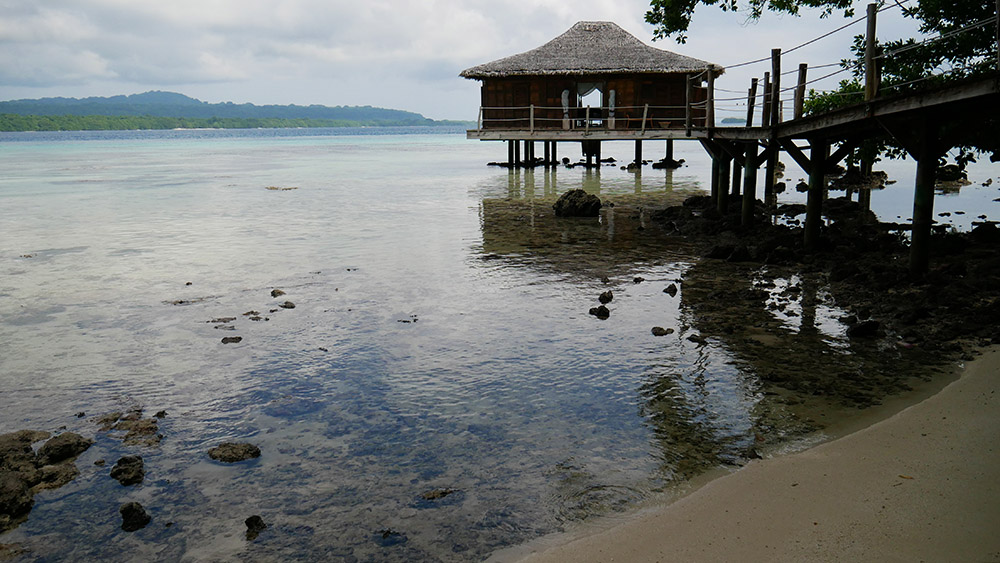
Tourism in the Pacific relies heavily on natural habitats and ecosystem servicesecosystem services Ecosystem services are the goods and services provided by nature which are experienced as or transformed into benefits for human society. They are generally classed as 'provisioning' (material things that are consumed), 'regulating' (non-material benefits derived from habitat functioning), and 'cultural' (non-material benefits obtained from an experience of nature, including tourism).. This reef-based establishment is on Espiritu Santo.
Tourism relies heavily on the natural and social environments throughout the Pacific. Harmonising place and development through ecosystem-based approaches can benefit all.
Tourism is strongly interlinked with the natural and social environment, in particular in destinations around the Pacific, such as Vanuatu. These environments are vulnerable to climate change which impacts on the social–ecological system of destinations. Ecosystem-based Adaptation (EbAEbA Ecosystem-based adaptation - an adaptation approach to climate- and environmental-change which primarily deploys ecosystems and ecosystem functions to mitigate risks from hazards.) uses ecosystems to manage the risks of climate change.
However, a gap remains in understanding how the tourism sector can use EbA to create destination wide benefits. The destination EbA framework presented here aims to address this gap by focusing on well-being and climate risk reduction. The framework is applied to a Pacific case study site, Tanna Island in Vanuatu, by drawing on primary qualitative data. Results highlight that EbA offers an approach for the tourism sector to create holistic benefits to destinations. Several constraints to successful implementation, and how these may be overcome, are identified.
The article contributes by providing a framework for other destinations which aim to create benefits through tourism.

Fig. 1: Ecosystem-based Adaptation as NbS to address climate change and create well-being. Source: Adapted from IUCN NbS framework (Cohen-Shacham et al., 2016).

Fig. 2: The Destination Ecosystem-based Adaptation Framework (DEAF). Source: Informed by IUCN NbS framework, Organisation for Economic Cooperation and Development well-being framework and Intergovernmental Panel on Climate Change Risk Assessment framework.
Publication
Loehr, J., Becken, S., Nalau, J., & Mackey, B. (2020). Exploring the Multiple Benefits of Ecosystem-Based Adaptation in Tourism for Climate Risks and Destination Well-Being. Journal of Hospitality & Tourism Research, 1096348020944438.
Acknowledgements
The authors would like to thank all participants and Ni-Vanuatu research assistant for their time and contribution to this study as well as the feedback of the anonymous reviewer. This research was supported in part by a grant from a private charitable trust that wishes to remain anonymous to avoid unsolicited funding proposals. The donor had no influence on any aspect of the research reported here. The Authors declare that there is no conflict of interest. Field work was supported by a grant from a private charitable trust.
About the lead author:
Dr. Johanna Loehr
Research Fellow, Griffith Institute for Tourism.
Request a copy of the article
If the download article link below doesn’t work, or leads to a page that requests payment, please click the link to the author profile above and request a copy directly and they will be happy to assist. Not all reviewed journal articles are published as ‘open access’, which are free to download.
